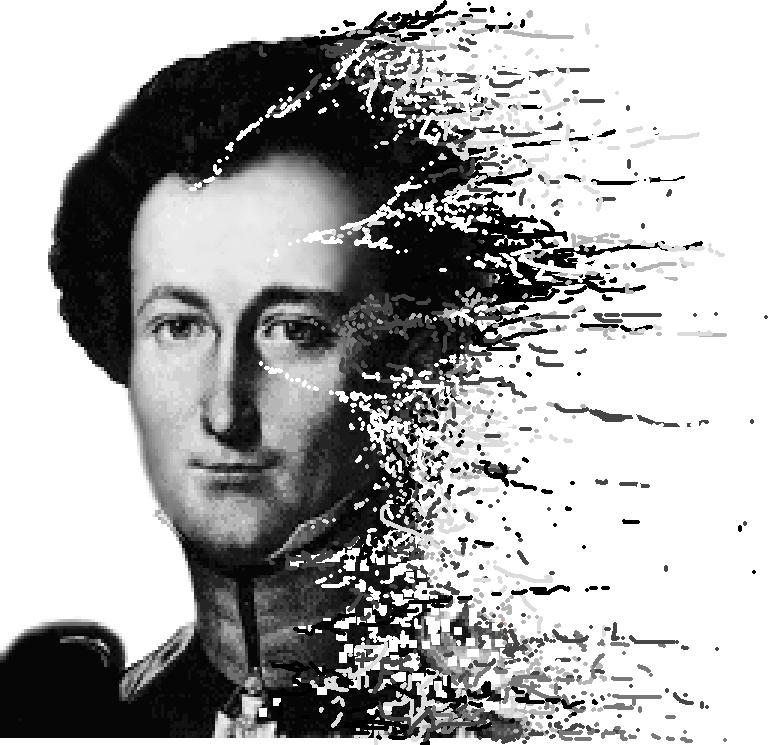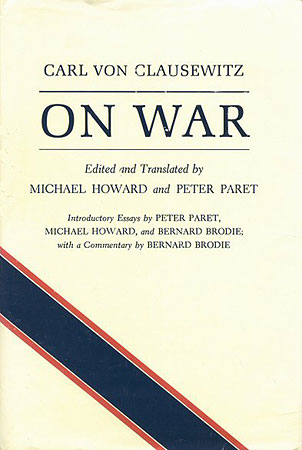
One of the nicest things about ZP is the quality of the commenters. In a post by Charles Cameron, 2083 – Breivik and the Qur’an, deception and warfare, there was this exchange between Joseph Fouche and Seydlitz89 after the latter disputed the utility of looking at the Norwegian mass-murderer Anders Breivik through the lens of strategy:
Joseph Fouche:
From Clausewitzian perspective, Breivik’s actions are the conjunction of the three poles of the Trinity, two of which have nothing to with Breivik’s rationality. If CvC can’t be applied to madmen, criminals, mass murderers of children, or men trapped in their own little world, then Van Creveld’s contention that the actions of madmen can’t be considered political (in noted Clausewitzian Christopher Bassford’suse of the word) is correct. War would be “nontrinitarian“.
The words and ideas of murderous stooges have consequences as well as their actions. CvC can shine as much light on them as he can on any other field of human conflict.
Can Breivik’s actions can be considered war? Can an individual wage war? By his own sinister lights, Breivik considered himself at war, the Pied Piper of a host of other Breiviks born and unborn, even if that host only existed in his fevered imagination.
Can an individual have a strategy? Or can an individual only have a strategem? Breivik had a plan that had a tactical expression and apolitical effect (as here we comment on the doings of an otherwise obscure Norwegian). Does the jumbled mass of tissues that connect his evil ends with his evil means rise to the level of strategy?
In her recent book The Evolution of Strategy, noted CvC scholarBeatrice Heuser examines the modern history of the word strategy since Guibert revived it in the mid-eighteenth century. Even the core understanding of the word, the art of connecting political ends with (operational or tactical) military means, has shifted since CvC as the scale and ambitions of campaigns increased. Heuser herself chooses to refer to strategy as understood by Clausewitzians (connecting political ends with military means) with a capital S to differentiate [it] from other current uses.
In that light, was Breivik a Strategist or a strategist? Where do we put the raid on Harpers Ferry or the Beer Hall Putsch, two events that were equally ridiculous and equally consequential? What’s the cutoff point between crime and war? What’s the cutoff point between Strategy and strategy? John Brown’s 21? Herr Hitler’s 100? Or Breivik’s one?
Fouche, who it must be said, is no fan of eminent Dutch-Israeli military historian Martin van Creveld, is referering to MvC’s theory of the decline of the state and “non-trinitarian” warfare of non-state or non-Westphalian entities that van Creveld articulated in The Transformation of War, The Rise and Decline of the State and other books and articles since the 1990’s. The 4GW school adopted van Creveld’s ideas of state decline and to significantly varying degrees, his critical attitude toward Clausewitzian theory (van Creveld’s own assessment of Clausewitz also seems to vary in his works).
Seydlitz89, himself a noted Clausewitzian, responded:
You’re mixing apples and oranges. Clausewitzian strategic theory pertains to collectives, all concepts pertain to collectives – victory, defeat, strategy, tactics . . . and a very particular collective at that – political communities. “War” does not consist of one individual fighting against a political community, that is criminality, and always has been. This is the very definition of what being a criminal, an outcast, or a traitor is all about . . . “War” on the other hand is organized violence within or between political communities which involves once again collectives. These collectives would have to enjoy both moral and material cohesion within them which in turn allows them to use violence as an instrument in their political actions. The Nazis, as repugnant as they were, did gain “legitimacy” (yet another collective concept) over time and formed a political community around them of Germans dissatisfied with the “system” of their time, and their political takeover did constitute a revolution.
ABB is all about ABB and nothing more. Assuming that his “message” or rather mad rant is going to draw an audience and a following is an assumption, based on what exactly? Great knowledge of how “Europeans” feel about immigration? Define “Europeans” and how this act is going to mobilize concerted action against immigrants, draw a political community around it?
Even if he did appeal to a selection of alienated loners who bought his sorry soap, that would not constitute them as a political community nor make their struggle war.
If ABB is a “warrior” fighting a “war”, than so was Charles Manson.
[ Sidebar: Seydlitz has, BTW, previously undertook a formal two-part paper at the old DNI site on this subject, one very much worth reading, that serves as a Clausewitzian rebuttal to van Creveld :The Decline of Strategic Theory – the Influence of The Transformation of War and part II. The Continued Existence of the State: The Clausewitzian Concept of Cohesion ]
The discussion of whether or not an individual can wage “war” is interesting because it takes place largely at the level of fundamentals. Politics, polities, policy, the State, war. All terms with somewhat different meanings depending on the philosophical tradition brought to the table. Or lack thereof. Strategic discussions are frequently impoverished because of the extinction of systematic education in the Western canon in this country, it is almost dead, even at the university level, which means that those interested in matters of strategy and diplomacy need to dedicate themselves to personal programs of professional reading and reflection. Some things need to be read firsthand and more than once to be understood.
Can an individual “wage war”? Can they have ” a strategy”? Some very meandering thoughts from me on the subject [Joseph Fouche and Seydlitz are cordially invited to guest-post here in response, if they so desire]:
Historically, this was usually a moot point. The ability of private individuals to use violence that could have a strategic effect on a whole political community was virtually nil – with one exception – assassination. While seldom fully successful, tyrannicide or regicide was celebrated and feared in the ancient world because in highly personalized polities with absolute rulers, such a decapitation attack could paralyze a society as heirs of the ruler struggled for succession or plunge it into anarchy and civil war. Walter LaQueur devotes the first part of his Voices of Terror to examples of ancient assassination for this reason.
Assassination, it should be said, is still more likely to be associated with personal grievance, mental illness or political protest than strategic intent. Brutus and Cassius and their fellow conspirators had a strategic intent in assassinating Julius Caesar, namely reversing the fortunes of civil war as well as the political intent of ending Caesar’s Dictatorship as a regime and restoring the Republic under the dominance of patrician Optimates. By contrast, Charles Guiteau who assassinated President Garfield was merely insane, while Soghomon Tehlirian’s motive for killing Talaat Pasha was vengeance for the Armenian Genocide.
However, as the potential for using assassination at a strategic level exists, then the possibility that an individual may do so of their own accord, instead of as an agent of a state or out of personal grievance, also exists. It’s just quite rare once a society ascends from the Hobbesian hunter-gatherer stage of development to true chiefdoms or kingdoms because two things change: first, a chiefdom or kingdom is a political community that creates and enforces all kinds of constraints, incentives, rules and specialization of tasks related to warfare on individuals in the tribe. Secondly, the scale of society in a chiefdom or kingdom or state vs. a hunter-gatherer band makes an individual’s one-man war impractical. Society has grown far too large. Even if the head is willing, the reach exceeds the grasp.
Now, this truism of war being a collective endeavor, which Seydlitz rightly identifies as being the case and has been so for thousands of years, is now in jeopardy with the acceleration of technological capabilities and ever cheaper productions costs disseminating them into many hands. This is the theory of the “superempowered individual“, that technology that can permit one person to inflict damage on an enormous scale was becoming too common, as is information about where such technology could be leveraged to best effect. We are not quite there yet, but we have had some serious foreshadowing of SEIs with Ted Kaczynski, the unknown Anthrax mail terrorist and the partially successful WMD terrorist efforts of the Aum Shinrikyo cult. Right now, it is still collectives that are the likeliest culprits for waging a mass casualty attack but those collectives have gotten uncomfortably small in size. Nation-states are far more dangerous and versatile entities, if slow moving and obvious, but they are no longer required if your intent is to inflict strategic damage and eventually, all you will need is one unusually resourceful and intelligent individual.
With individuals and, more commonly, very small substate groups waging war, the nature of warfare will change from the culture of warfare that typified the era of Westphalian nation-states with their centralizing hierarchical bureaucracies, mobilized industrial economies, conventional armed forces and populations bristling with nationalism. Smaller entities that lack the vast resources of states are going to be idiosyncratic in their approach to warfare because their capacity to sustain conflict, what motivates them to stand, fight and die, how they conceive their “Ends” differs from that of states.
Can you use Clausewitz’s general theory to analyze them? Sure, Clausewitz proposed, after all, a general theory of war, but if you operate with the implicit assumption that the non-state adversary will “do strategy”just like a state your analysis is likely to be off. The utility of van Creveld’s theory is his emphasis on their non-Westphalian characteristics of these combatants and their blurring of war with crime, religion, culture and politics which goes to the heart of what might be the nature of warfare in this epoch; where the irregulars are no longer marginal players but represent the new normal and interstate conventional war among great powers is the outlier.


 cholera, having finally risen to a military post his talents merited. He had been writing On War since 1816 and it was far from completed or refined to his satisfaction and it is highly unlikely, in my view, that Clausewitz would have consented to it’s publication in the condition in which he left it. His determined and intellectually formidible widow, Marie von Clausewitz, further shaped the manuscript of On War, guided by her intimate knowledge of her husband’s ideas and was likely the best editor Clausewitz could have posthumously had.
cholera, having finally risen to a military post his talents merited. He had been writing On War since 1816 and it was far from completed or refined to his satisfaction and it is highly unlikely, in my view, that Clausewitz would have consented to it’s publication in the condition in which he left it. His determined and intellectually formidible widow, Marie von Clausewitz, further shaped the manuscript of On War, guided by her intimate knowledge of her husband’s ideas and was likely the best editor Clausewitz could have posthumously had.



